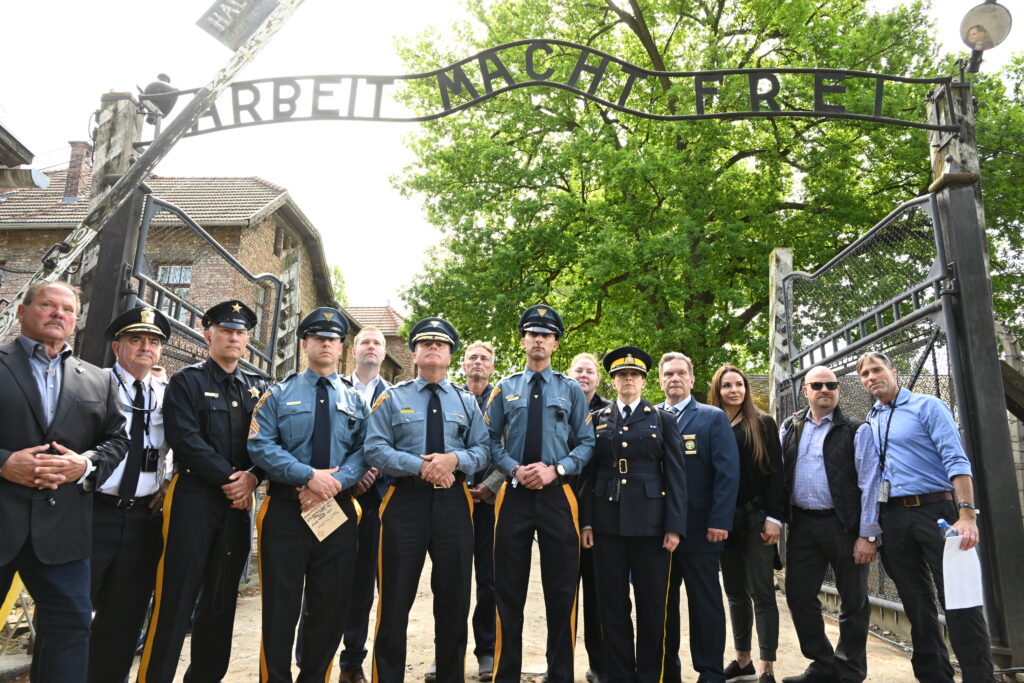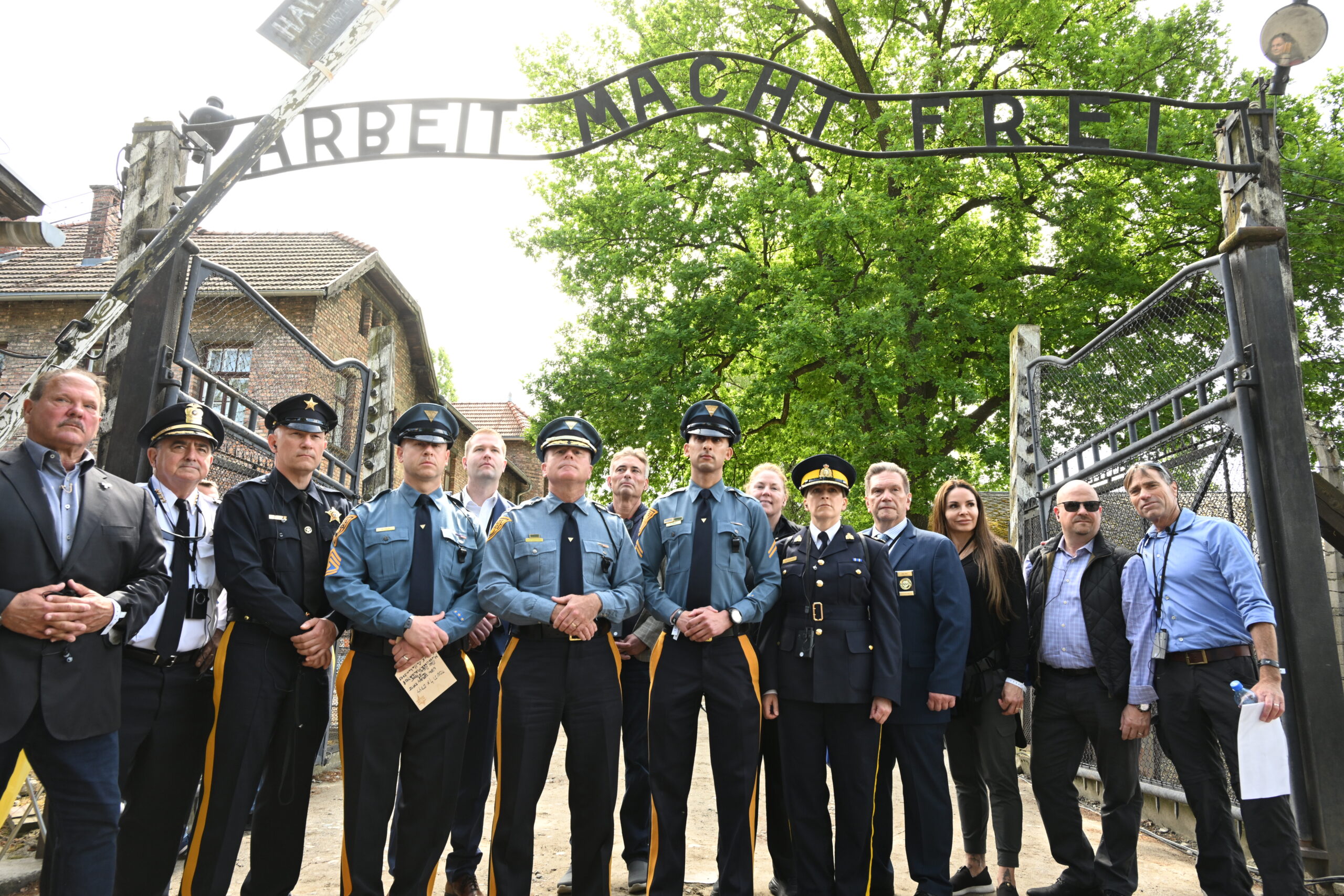
Rutgers Miller Center and UVA Center for Public Safety and Justice launch global initiative to train law enforcement in ethical leadership, community protection, and genocide prevention
New Brunswick, N.J. & Charlottesville, Va. – Rutgers University’s Miller Center on Policing and Community Resilience and the University of Virginia’s (UVA) Center for Public Safety and Justice (CPSJ) are leading the largest-ever global law enforcement delegation to participate in the International March of the Living, commemorating Holocaust Remembrance Day (Yom HaShoah) and the 80th anniversary of the liberation of Auschwitz.
On April 24, 2025, more than 60 leaders in law enforcement from across the United States, Europe, the United Kingdom, Africa, and members of the Global Consortium for Law Enforcement Training Executives (GCLETE) will join 80 Holocaust survivors, families of Holocaust victims, and participants from around the globe in a powerful march from Auschwitz to Birkenau — standing in remembrance of the past and in defiance of modern-day hate and extremism.
“The program aligns with the Rutgers Miller Center’s mission to foster global partnerships and innovation in law enforcement training,” Paul Goldenberg, Chairman of the Police Delegation and Chief Advisor to the Rutgers Miller Center on Policing and Community Resilience, said. “This program provides an unprecedented opportunity for leaders to reflect, learn, and take actionable steps to ensure accountability and ethical leadership in their organizations, and does not address this only for history’s sake – because remembering is not enough.”
The delegation includes leaders from the International Association of Chiefs of Police, the National Sheriffs’ Association, the International Association of Campus Law Enforcement Administrators, the Small & Rural Law Enforcement Executives Association, as well as police unions from Germany and Sweden. It marks the largest participation by law enforcement in the event’s 35-year history.
“The Law Enforcement Delegation is a powerful representation and testament to the commitment of those serving communities around the world to ensure these atrocities never occur again,” Phyllis Greenberg Heideman, President of the International March of the Living said.
The experience is a culminating component of a new executive training program, “Operationalizing Never Again: The Role of Law Enforcement in the Holocaust and Contemporary Genocide,” co-developed by the Rutgers Miller Center and UVA’s CPSJ. Launched earlier this year, the program equips law enforcement leaders with tools to address antisemitism, bias, and human rights violations through a curriculum rooted in Holocaust history, ethical leadership, and community protection.
“Rutgers University and the Miller Center are committed to bridging the gap between law enforcement and the communities they serve through education and collaboration. This program centers the Holocaust’s abiding relevance to today’s world. It’s all too easy to view the Holocaust as history; the March of the Living, and the program we are advancing, insists on its relevance to human rights, to best policing practices, and to the future human prospect,” said John J. Farmer Jr., Director, Rutgers Miller Center on Policing and Community Resilience.
“This is more than a history lesson; it’s about equipping leaders with the skills to navigate ethical dilemmas and uphold justice in a rapidly changing world,” said Marvin Ben Haiman, Executive Director of UVA’s CPSJ, highlighting the broader vision of the initiative. “This course and the experience of participating in the International March of the Living is a life changing experience.”
CLICK HERE to watch a video highlighting the initiative and March for the Living.
###
For media inquiries, please contact:
Rutgers Miller Center: Mark Genatempo, Senior Fellow, mark.g@rutgers.edu
UVAs CPSJ: William Page, Program Manager, qug5wg@virginia.edu
About the Collaborators
Rutgers University Miller Center on Policing and Community Resilience focuses on improving the relationships between law enforcement and vulnerable communities through education, best practices, and research.
University of Virginia Center for Public Safety and Justice serves as a hub for leadership development, research, and education in public safety, promoting innovation and public service.
March of the Living – Each year, thousands of participants join the March of the Living—Jewish and non-Jewish youth from dozens of countries around the world—alongside Holocaust survivors, heads of state, ministers, religious leaders, intellectuals, cultural figures, and more. To date, over 300,000 participants have walked along the railway tracks from Auschwitz to Birkenau, in tribute to the greatest loss in the history of the Jewish people and of humanity. For more information visit: www.motl.org
Global Consortium for Law Enforcement Training Executives (GCLETE) brings together global leaders to advance training and professional development in law enforcement.









